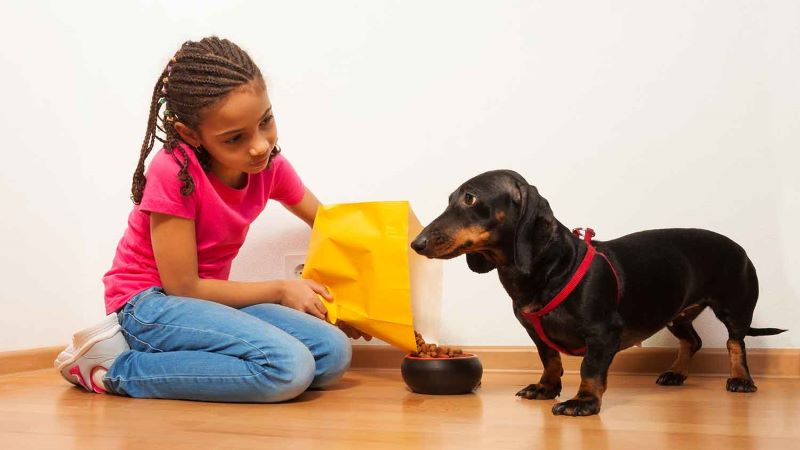A dog’s digestive system
Before we dive into feeding a dog with a sensitive stomach, we must take a look at how the dog's GI tract works, just like we looked at a cat’s digestive system. Dogs and human digestive systems are similar in a couple of ways. Dogs can get heartburn and indigestion just like you and me. Most dogs can digest and utilize carbs (thanks to adaptations that have been made since they’ve been domesticated) so it is not necessary to feed a grain-free diet (unless there are other dietary factors present). But that’s where the similarities stop. Dogs cannot chew side to side like we can, only up and down and they are not affected by cholesterol. Perhaps the most interesting difference is that food moves through a canine’s digestive system three times as fast as ours. That might explain why my dog asks to go out immediately upon finishing her breakfast!
Knowing all of this can help us when we set out to make sure we are feeding our dog well. If your dog is experiencing GI issues, it’s best to check in with your vet first, to rule out any serious problems.
Visit your veterinarian
According to Dr. Jan Suchodolski, associate professor and associate director for microbiome sciences of the Gastrointestinal Laboratory at Texas A&M University, GI diseases account for about 10% of vet visits. It is important to pay attention to your dog’s potty habits so you can establish a “norm” for him/her and so you will know if something more serious than indigestion is plaguing your pup. If your dog seems to be asking to go out more often than normal, you will want to check his stools. Your dog’s poop can tell you a lot about his health. Diarrhea can be caused by parasites, bacteria, or viruses and a dog who is straining to defecate or is unable to poop and becomes constipated may develop a serious health issue.
Pay attention to eating patterns
My parents’ dog ate so quickly that she would turn around and vomit the entire meal on the kitchen floor. They invested in a slow feed bowl and that did the trick. Lily went from eating from her regular bowl (it took her one minute to polish off dinner) to eating from the Kong Slow Feed Puzzle Bowl where it took almost three minutes for her to find all the kibble. You can see Lily in action here. It can also be helpful to feed your dog two smaller portions of food, one in the morning and one in the evening, instead of a large meal once a day.
Try an elimination diet
Your dog’s diet may be to blame for tummy issues. Protein type, insufficient fiber, and excess fat can all be dietary culprits for indigestion. If your dog is experiencing recurring skin and ear infections in addition to GI upset, a food allergy may be the source of the problem. Food allergies are less common than food intolerance, which can arise from any ingredient. If you suspect your dog is suffering from food intolerance, the best plan is an elimination diet to narrow down your dog’s food options until you find a food that works. Just remember while you are instituting this diet, everyone in your house must be on board. Be careful not to feed or allow anyone else in your family to feed your dog table scraps or extra snacks so you have a clear picture of what does and does not irritate your dog’s stomach.
Consider a diet for sensitive stomachs
If after your diet trial you still cannot find a food that meets your dog’s needs, you can try a diet made specifically for sensitive tummies. These foods contain plenty of fiber ingredients, such as psyllium or beet pulp, to help firm up loose stools. They should also contain low amounts of fat and plenty of probiotics to promote good bacteria in the gut.
Be proactive about your dog’s health!
Making and keeping regular vet appointments is very important when it comes to your dog’s GI health. Once your vet gets to know your dog, he will be able to decipher whether your dog is experiencing GI upset due to something he ingested or whether the issue is more serious. When you enroll your dog in pet health insurance, you can afford to provide the best veterinary care when you need help getting to the bottom of GI issues. Get a quote today!

